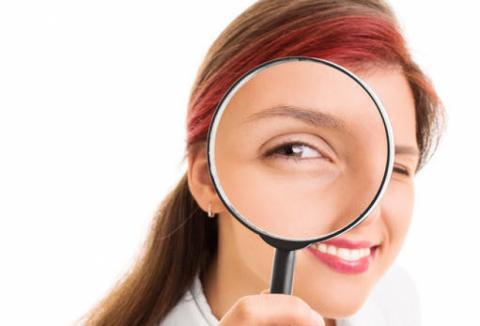I have an invisible illness; yet, it screams look at me. When I park in a handicap parking spot without a wheelchair, a walker, or a cane, people look at me. They may assume I don’t belong there or want to ask me if I do. When I’m walking through a store or across the playground to watch my friend’s kids play ball, sometimes, my body will betray me, and I’ll fall. And people look at me. They’re not quite sure if they should help me or leave me to fend for myself. Sometimes, they’ll take a chance and make the offer, which I always appreciate. Even though it’s humbling to need the assistance of strangers, it’s certainly better than attempting to rely on a body that isn’t going to cooperate with me.
In the ten plus years I’ve had this illness, I’ve learned that looking is a way of asking questions few people will voice. I’m watched, governed by curious gazes and murmurs that aren’t quite low enough to keep me from hearing. A side glance as I pass by or an outright stare as I am helped to my feet by caring friends always serves as a reminder that, though the illness is invisible, I am not.
Many people consider the glances and whispers rude, but, to me, we all have an innate curiosity about the unknown. Isn’t that why we watch documentaries and movies, read books, or listen to speeches? How many times do we question our phone, use a search engine to solve a mystery, or call a friend because we need an answer? We want to know more about the past, the present, and the future, and by asking questions, we learn.
In school, we’re encouraged to ask questions if we don’t understand something. We ask questions of celebrities, politicians, authors, and artists because we’re interested in how their lives are so vastly different from ours. Some questions may fall in the nosy category, but we are conditioned to question that which we do not understand. As a handicapped person, like it or not, I am different than the rest of the world, and people want to know how I’ve adjusted or accomplished what I have in my life.
We’re all taught from an early age that it’s rude to stare or to ask someone why they walk with a cane, but curiosity can also be a way of expressing concern. People want to know if I’m okay or if I need help, but, sometimes, they just don’t know how to ask. Maybe they’ve been rebuffed before for their offer so they feel helpless, frozen in uncertainty. Beyond that, the people who look at me seek knowledge. No, it might not be any of their business why I’ve fallen, but if I can educate one person to understand that not every handicapped person has a visible illness, where’s the harm in that?
I don’t announce my disability to anyone, and few people know about this illness’ effect on my body until it manifests itself visibly. When it shouts “look at me”, I’m given no choice but to face the onlookers as I crawl to my feet or seek out help when I know I’m seconds away from losing consciousness. To me, the stares are just another part of this illness, not necessarily a symptom but an aftereffect. I do admit, though, that sometimes, when I’m filling out paperwork at a new doctor’s office, I’m tempted to list “curious looks” as a symptom.
Few people are brave enough to approach me and ask what they really want to know. Why did you fall? Why are you so pale? Why are you wearing sunglasses in the middle of a store? Why do you hold onto that woman’s arm when you walk? So when I see the questioning looks, I smile and hope that by doing so, I’m letting them know I’m open to the questions. I may even make a comment that invites a conversation, and when I do, I usually receive looks of relief.
I’m not ashamed of my disability. I have no reason to look away or hide myself inside my house until all is dark. I’m thankful that I can venture out and melt into the crowd of able-bodied people, and those days when I don’t have complete control over everything my body does, I have to take the looks with the many times my skin meets the pavement.
The most obvious stares come from children who simply want answers. They don’t know why I’ve fallen or why I have a huge bruise on my arm. So they ask. Because my body is telling them to look at me. And with the looking comes the questions that I answer, and not surprisingly, it’s the adults who usually continue the conversation once their child has broken the ice. Again, it’s innate curiosity, and I believe there’s a big difference between being nosy and wanting to understand that which is different.
This disability challenges my life and, on occasion, puts me on display. I have been forced to learn how to adapt. Part of adjusting is accepting that I cannot be as invisible as my illness is and knowing that when I’m lying on the floor with my Look at Me sign, the people around me aren’t my enemies. They’re simply people who want to help and may not know how. So I let them know if I need assistance, and when I’m back on my feet and able to go about my day, I figure answering a few questions is the least of my concerns. For as Charles de Lint said, “I don’t want to live in a world where we don’t look out for one another. Not just the people who are close to us but anybody who needs a helping hand.” Right now, I am that body.




